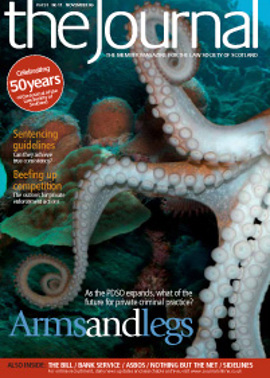Man of business

For those of you who do not know (perish the thought!), the Isle of Man occupies a position in the middle of the Irish Sea. Although the Isle is only 33 miles long and 30 miles wide with a population of 80,000, it is now in its 21st year of unbroken economic growth. In addition, it has been able to maintain a coveted AAA credit rating from both Standard and Poor’s and Moody’s Credit Rating Agencies since 2000.
There are a number of tax and legislative incentives that make the Isle an interesting proposition for Scottish lawyers to consider for their clients.
Tax: a lighter burden
There is no capital gains, inheritance tax or stamp duty in the Isle of Man.
Since April 2006 a cap of £100,000 on an individual’s income tax liability has been introduced. This cap is available for all taxpayers, both current residents and new residents.
The Isle of Man has traditionally offered a tax-neutral jurisdiction from which to base efficient international tax planning. However, with effect from 6 April 2006, this offering has been simplified and enhanced.
With effect from 6 April 2006, the general rate of corporate income tax in the Isle of Man is 0%. A rate of 10% will apply to the following sources of income only:
- income derived from land and property in the Isle of Man – this will include both rental income and profits derived from dealing or developing land in the Isle of Man; and
- income arising from banking business carried on by banks licensed under the Isle of Man Banking Act 1998.
The zero rate of income tax was introduced in response to recent OECD and EU initiatives. The new regime removes the “ring fence” associated with tax exempt regimes and also meets the expectations of the international community as regards tax competition.
Launching the NMV
The New Manx Vehicle (“NMV”) was introduced in the Isle of Man on 1 November. This new corporate vehicle has been created and is governed by the Isle of Man Companies Act 2006. The NMV is a flexible and modern corporate vehicle which will be attractive to business, especially as a special purpose vehicle. Some of its key features include:
- no requirement for authorised share capital;
- no capital maintenance requirements (subject to satisfaction of a solvency test);
- reduced compulsory registry filings;
- less prescriptive accountancy requirements;
- no distinction between public and private companies;
- simplified offering document requirements;
- ability to have single directors (within certain limits) and corporate directors;
- no requirement to hold an AGM, and availability of transfer of domicile procedures, re-registration procedures and merger procedures.
The doctrine of ultra vires will not apply to the NMV. The Act expressly states that notwithstanding any provision to the contrary in a company’s memorandum or articles of association, and irrespective of corporate benefit and whether or not it is in the best interests of the company to do so, a company will have unlimited capacity to carry on or undertake any business or activity. In addition, in favour of any person dealing with a company in good faith, the power of the directors to bind the company or to authorise others to do so will be deemed to be free of any limitations (including limitations deriving from a provision in the memorandum or articles of association of the company, any resolution of the members of the company or any agreement between the members).
Once in force, the Act will be largely a stand-alone piece of legislation, and companies incorporated under the 2006 Act will co-exist with present and future companies incorporated under the existing Isle of Man Companies Acts 1931-2004.
Notwithstanding these provisions, the directors of an NMV will still be subject to the various duties imposed on directors at common law as well as fiduciary duties, including the duty to act bona fide in the best interests of the company and for proper purposes.
Competitive edge
The Isle of Man’s proposition is based on sound regulation coupled with excellent infrastructure and flexibility. The Isle is much larger than Jersey or Guernsey and does not have the space issues or residency restraints found in both of these jurisdictions. Administration costs are significantly lower than those of its competitors since the costs of property and staff are lower than in Jersey, Guernsey or Dublin.
The advantages of doing business in the Isle of Man are numerous and diverse. There is a close working relationship between government and the private sector to ensure that the Isle is a first class jurisdiction within which to do business.
Claire Milne is a Scottish solicitor specialising in IP/IT, now working with Dickinson Cruickshank, IoM
In this issue
- Home and away
- The importance of kinship care
- Growing arms and legs
- Changing its spots?
- Guiding hand
- Trustbusters unite
- Closing the books
- Spam: the managed solution
- Nothing like Nothing but the Net!
- Banking on service
- You want certified?
- Enough is enough
- Provision and prejudice
- Work and families
- Cash trapped
- Man of business
- Scottish Solicitors' Discipline Tribunal
- Website reviews
- Book reviews
- Sale questionnaire to be tested
- So long, and thanks for all the fizz
- ASBO, the young misfit






